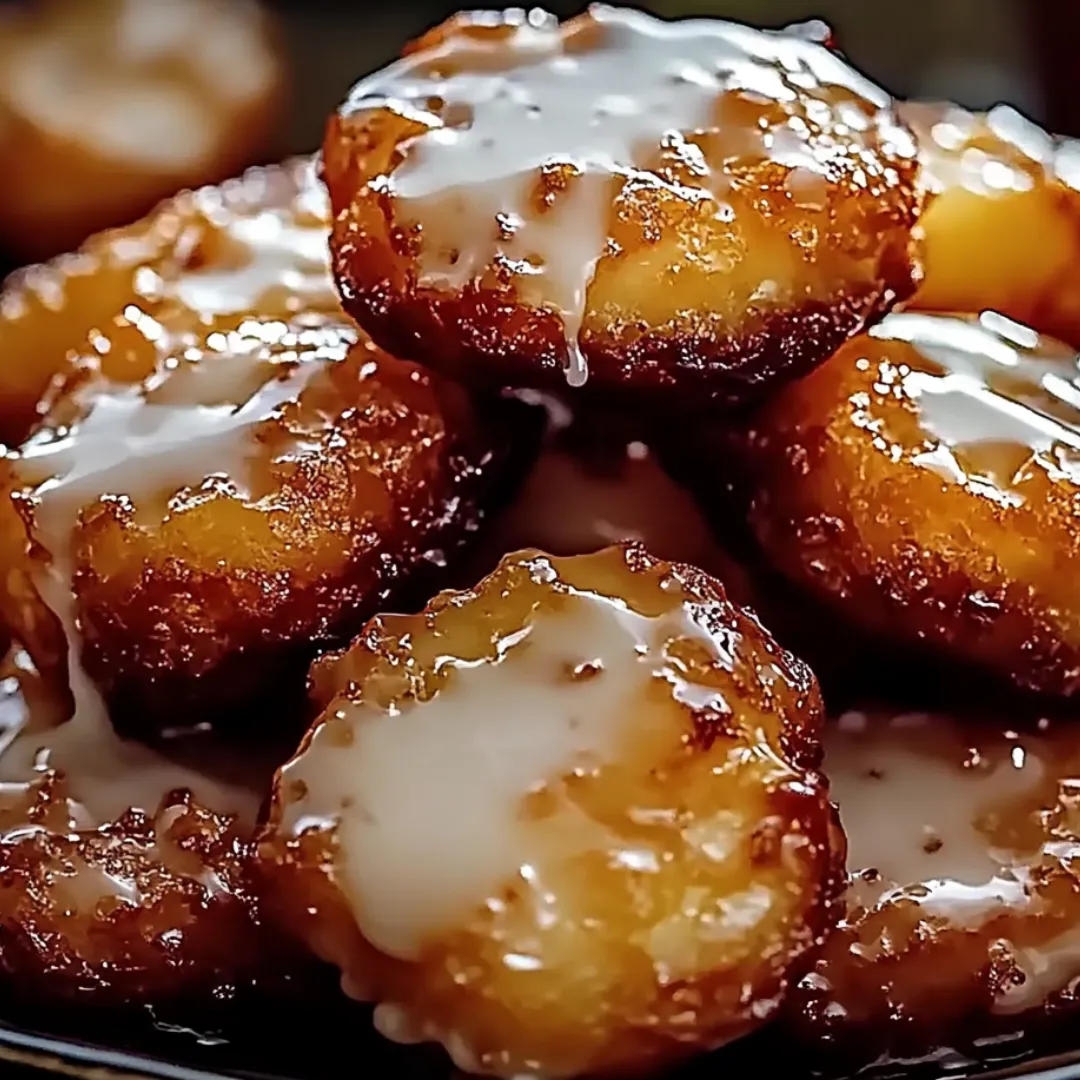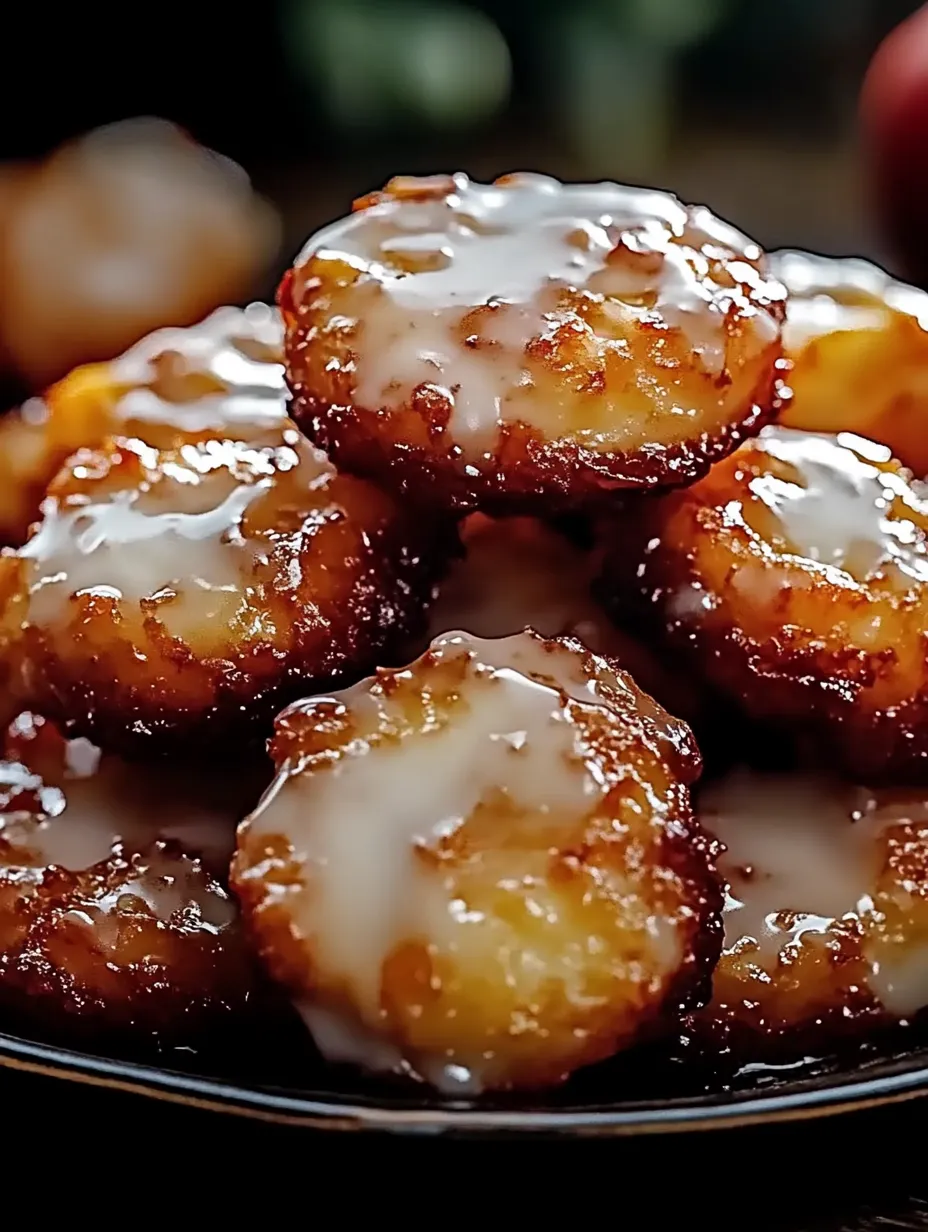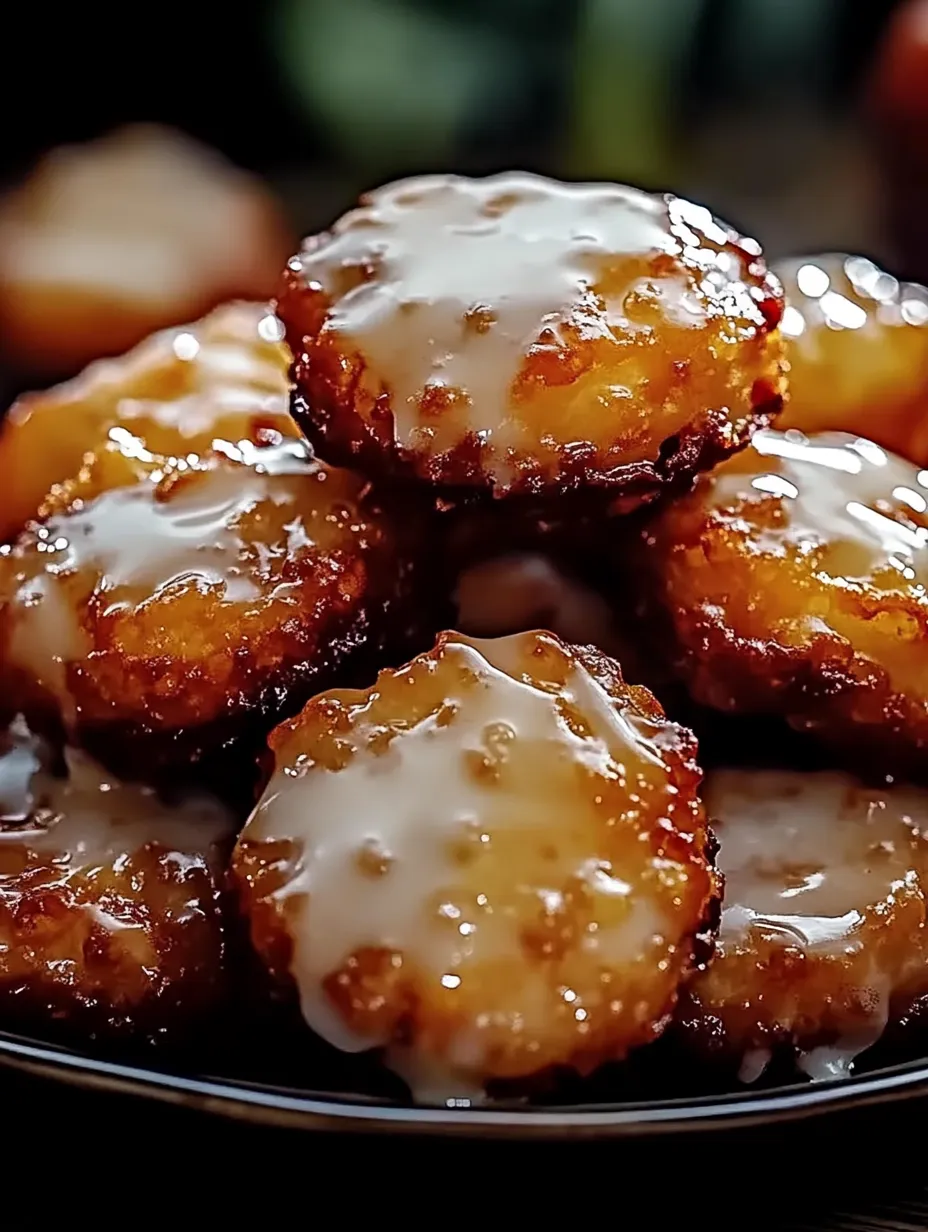 Pin it
Pin it
The comforting aroma of warm spiced apples and golden, crisp exteriors make these baked apple fritters an irresistible treat for any occasion. Unlike traditional fritters that require deep-frying, this healthier baked version delivers all the delicious flavor and texture you crave without the extra oil. Each fritter features tender chunks of fresh apple nestled in a cinnamon-spiced batter, finished with a sweet glaze that adds the perfect touch of indulgence. Whether enjoyed as a special breakfast, afternoon snack, or dessert, these apple fritters bring warmth and comfort to any day of the year.
The first time I made these baked fritters, I was honestly skeptical that they could match the deep-fried version my grandmother used to make. But after one bite, I was completely won over. The edges develop a wonderful golden crispness while the center stays moist and tender, studded with juicy apple pieces that practically melt in your mouth. My family now requests these regularly for Sunday brunch, and guests always ask for the recipe, amazed when I tell them they're baked, not fried. My daughter even prefers helping with these over our traditional Christmas cookies—she says dicing the apples and drizzling the glaze makes her feel like a real pastry chef!
Essential Ingredients
- Fresh apples: Choose firm, crisp varieties like Granny Smith for tartness or Honeycrisp for natural sweetness. The apples should be peeled and diced into small, uniform pieces for even distribution and cooking.
- All-purpose flour: Provides structure to the fritters. For best results, use unbleached flour and measure by spooning it into your measuring cup rather than scooping directly from the bag.
- Brown sugar: Dark brown sugar is preferred for its rich molasses content that adds depth and caramel notes. Make sure it's fresh and soft for proper incorporation.
- Baking powder: Critical for creating lift and a light texture. Check the expiration date to ensure it's active for the best rise.
- Warm spices: A blend of cinnamon, nutmeg, and allspice creates that classic apple fritter flavor profile. Freshly grated nutmeg makes a noticeable difference in the final taste.
- Milk: Whole milk provides richness, but any milk (including plant-based alternatives) will work. The milk should be at room temperature for better incorporation.
- Egg: Acts as a binder and adds richness. Use a large egg at room temperature for best results.
- Vanilla extract: Pure vanilla extract enhances the overall flavor. Look for real vanilla rather than imitation for the best flavor.
- Powdered sugar: The base for a simple glaze that adds sweetness and a beautiful finish. Sift it first to prevent lumps in your glaze.
- Milk for glaze: Just a small amount creates the perfect consistency for a pourable glaze that sets beautifully on the warm fritters.
 Pin it
Pin it
Step-by-Step Preparation
- Prepare your baking environment properly:
- Begin by preheating your oven to 375°F (190°C) and line a baking sheet with parchment paper. The parchment prevents sticking and makes cleanup easier. Position your oven rack in the middle position for even heat distribution. This temperature allows the fritters to develop a golden exterior while ensuring the interior cooks through properly.
- Prepare the apples with precision:
- Peel the apples completely, then core and dice them into small, uniform pieces approximately 1/4-inch in size. Consistency in size ensures even cooking and proper distribution throughout the batter. After dicing, place the apples on a paper towel to absorb excess moisture, which could otherwise make your fritters soggy.
- Combine dry ingredients thoroughly:
- In a large mixing bowl, whisk together the flour, brown sugar, baking powder, cinnamon, nutmeg, allspice, and a pinch of salt. Whisking thoroughly at this stage ensures even distribution of the leavening agents and spices throughout the batter. This step is crucial for consistent flavor and texture in every fritter.
- Mix wet ingredients separately:
- In a separate medium bowl, whisk together the room temperature milk, egg, and vanilla extract until completely combined. The egg should be fully incorporated with no visible strings of egg white. Using room temperature ingredients helps them incorporate more easily and creates a smoother batter.
- Create the batter carefully:
- Gradually add the wet mixture to the dry ingredients, stirring with a wooden spoon or rubber spatula until just combined. The batter should be thick and slightly lumpy—overmixing will develop too much gluten, resulting in tough fritters. Stop mixing as soon as no dry flour pockets remain.
- Incorporate apples gently:
- Add the diced apples to the batter and fold them in with a gentle hand. Use a folding motion rather than stirring to maintain the lightness of the batter while ensuring the apples are evenly distributed. Every bite of the finished fritter should contain apple pieces.
- Shape with intention:
- Using a 1/4-cup measuring cup or an ice cream scoop, portion the batter onto the prepared baking sheet, spacing the fritters at least 2 inches apart. The batter will spread slightly during baking. For a more rustic, authentic appearance, avoid smoothing the tops—the irregular shape mimics traditional fried fritters.
- Bake to golden perfection:
- Place the baking sheet in the preheated oven and bake for 15-18 minutes, or until the fritters are golden brown around the edges and a toothpick inserted into the center comes out clean. The tops should be firm to the touch with a slight spring-back. For extra crispness, you can broil them for the final 30 seconds, watching carefully to prevent burning.
- Prepare the glaze while baking:
- While the fritters are in the oven, prepare the glaze by whisking together 1 cup of sifted powdered sugar with 2-3 tablespoons of milk until smooth and pourable. The consistency should be similar to honey—thick enough to coat the back of a spoon but thin enough to drizzle easily. Add more milk or powdered sugar as needed to achieve the right consistency.
- Apply the glaze at the optimal moment:
- Allow the fritters to cool on the baking sheet for approximately 5 minutes before glazing. This brief cooling period ensures the glaze won't completely melt off, but the fritters will still be warm enough for the glaze to partially absorb, creating that characteristic fritter finish. Drizzle the glaze generously over the warm fritters using a spoon or fork for that classic bakery appearance.
I've made these fritters countless times, and I've discovered that the apples are truly the heart of this recipe. My first attempt used apples diced too large, which created pockets of undercooked fruit that made the fritters soggy in spots. After experimenting, I found that a fine dice—about the size of a pencil eraser—creates the perfect balance where the apples cook through completely while still maintaining their identity in the finished fritter. My husband, who grew up helping at his family's donut shop, was initially skeptical about a baked version, but now admits these have earned a permanent place in our weekend rotation. The trick that won him over? That brief stint under the broiler at the end that creates the authentic crisp edges he remembers from the fried version.
The Art of Apple Selection
The variety of apple you choose significantly impacts both the flavor and texture of your finished fritters. For a traditional apple fritter experience, consider these options: Granny Smith apples provide tartness that beautifully balances the sweet batter and glaze. Their firm texture holds up well during baking, maintaining distinct apple pieces throughout the fritter rather than dissolving into the batter. Honeycrisp apples offer natural sweetness with a hint of tartness and have incredible juiciness that keeps the fritters moist. Their crisp texture stands up to baking while still becoming tender in the finished product. Braeburn or Pink Lady varieties strike a middle ground with a balance of sweet and tart notes and maintain their structure during baking. These work particularly well when you want identifiable apple pieces that aren't too firm. For a more complex flavor profile, consider using a combination of varieties—perhaps Granny Smith for structure and tartness with a sweeter apple like Honeycrisp or Fuji to add dimension. This approach creates layers of apple flavor throughout each fritter. Regardless of variety, the key is fresh, in-season apples that are crisp and flavorful. Apples that have become mealy or soft with age will disappear into the batter rather than providing those delightful pockets of fruit that define a great apple fritter.
 Pin it
Pin it
Seasonal Variations
While classic apple fritters are perfect year-round, seasonal adaptations can keep this recipe fresh and exciting throughout the year. For a festive holiday version, add a quarter teaspoon of ground cardamom to the spice blend and incorporate a handful of dried cranberries along with the apples. The slight tanginess of the cranberries complements the sweet apples beautifully, while cardamom adds a sophisticated flavor note that pairs wonderfully with the traditional cinnamon and nutmeg. In summer months, consider adding fresh blueberries alongside the apples. The berries burst during baking, creating pockets of jammy sweetness throughout the fritters. A touch of lemon zest in both the batter and glaze brightens the flavors and adds a seasonal freshness. For autumn, embrace the season by adding a tablespoon of pumpkin puree to the wet ingredients and incorporating a handful of chopped toasted pecans with the apples. The pumpkin adds moisture and color, while the nuts provide contrasting texture and a buttery flavor that enhances the warm spices. During winter, a splash of maple extract in the glaze and a sprinkle of finely chopped crystallized ginger folded into the batter creates a warming treat perfect for cold mornings. The subtle heat from the ginger cuts through the sweetness while complementing the apples.
My final thought on these baked apple fritters is that they perfectly embody what I love most about cooking—finding ways to honor traditional favorites while making them accessible for everyday enjoyment. There's something deeply satisfying about creating a healthier version of a beloved treat that doesn't feel like a compromise. When my grandmother finally tried these after years of making the fried version, she smiled and said, 'Well, these certainly wouldn't get anyone kicked out of heaven!' Coming from her, that was the highest praise possible. These fritters manage to be both nostalgic and modern, indulgent yet sensible, and absolutely worth making any day of the week.
Frequently Asked Questions
- → Can I use different types of apples?
- Yes! While Granny Smith or Honeycrisp are recommended for their flavor and texture, any baking apple works well in this recipe.
- → How do I know when my fritters are done baking?
- They should be golden brown on top and a toothpick inserted in the center should come out clean with no wet batter.
- → Can I make these gluten-free?
- Yes, substitute the all-purpose flour with a 1-to-1 gluten-free baking flour blend for similar results.
- → Can I freeze baked apple fritters?
- Absolutely! Freeze unglazed fritters in an airtight container for up to 3 months. Thaw and warm before glazing.
- → Why are my fritters not rising well?
- Check that your baking powder is fresh - it should be replaced every 6-12 months for best results in baking.
